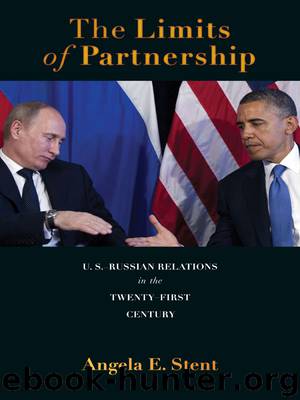The Limits of Partnership by Stent Angela

Author:Stent, Angela
Language: eng
Format: epub
Publisher: Princeton University Press
Published: 2013-08-19T04:00:00+00:00
U.S. BUSINESS IN RUSSIA
American investors had entered the Russian market even before the Soviet collapse. The prospect of the limitless pent-up demand of millions of citizens deprived of consumer goods for seven decades was very tempting. The natural resource sector initially seemed to be open for business and certainly in need of foreign investment and technology. Yet Russia soon became known as the “Wild East,” with rapid, nontransparent privatization, and mafia-like structures proliferating in a largely unregulated economy. Texas native Robert Strauss, who became the last U.S. ambassador to the USSR and the first to Russia, and subsequently the first chairman of the U.S.-Russia Business Council, said that Russia reminded him in some ways of the Texas of the 1920s in which he had grown up—poor but with great prospects. That is, there were attractive opportunities for young entrepreneurs who were up for the ride wanting to make a fortune—and willing to take the risks.
Some Americans who showed up in Russia participated in the first wave of privatizations, buying and selling privatization vouchers and participating in the stock market boom of the 1990s.30 Real estate was another profitable sector. But that also carried its dangers. Paul Tatum, part owner with a Chechen partner of Moscow’s first Western-style hotel, the Radisson Slavanskaya, was gunned down in a metro station in 1996 in a contract killing after disputes with his partner. Investors who believed they had signed contracts with Russian partners subsequently discovered after handing over their money that their investments were not protected, and their Russian partner had absconded with their money. Others established successful businesses only to have them taken away—sometimes at gunpoint—by Russian partners with no compensation. Nevertheless, the enormous opportunities offered by a market of 143 million people no longer shackled by socialism continued to attract the U.S. private sector.
In a pioneering study of the Soviet economic system published in 1957, Joseph Berliner outlined the key to success in the centrally planned economy: znakomstvo i svyazy—knowing the right people and having the right connections.31 This remains true for Americans operating in the Russian economy today. The most successful American entrepreneurs were those who worked systematically to understand the rules of the game, developed the right personal connections, and identified sectors that were open to foreign participation. Drew Guff of Siguler Guff is a prime example of an American entrepreneur who understood the rules and did well in Russia. In the early 1990s, Guff, a Russian-speaking Harvard graduate, worked for the investment bank Paine Webber, and his firm began a joint venture with an oil-trading firm partly owned by the Russian Orthodox Church. Their connections with then Patriarch Aleksei II extended to the highest levels of the Russian government, and in 1994 Guff agreed with Prime Minister Victor Chernomyrdin to launch the first private equity fund in Russia, a private-public partnership with the Russian government as an anchor investor. He launched Russian MTV in September 1998, a month after the collapse of the ruble. Subsequently, one of Guff and Siguler’s portfolio companies became involved in running the Internet cloud in Russia.
Download
This site does not store any files on its server. We only index and link to content provided by other sites. Please contact the content providers to delete copyright contents if any and email us, we'll remove relevant links or contents immediately.
| Anthropology | Archaeology |
| Philosophy | Politics & Government |
| Social Sciences | Sociology |
| Women's Studies |
The Secret History by Donna Tartt(19058)
The Social Justice Warrior Handbook by Lisa De Pasquale(12187)
Thirteen Reasons Why by Jay Asher(8894)
This Is How You Lose Her by Junot Diaz(6877)
Weapons of Math Destruction by Cathy O'Neil(6267)
Zero to One by Peter Thiel(5789)
Beartown by Fredrik Backman(5737)
The Myth of the Strong Leader by Archie Brown(5500)
The Fire Next Time by James Baldwin(5432)
How Democracies Die by Steven Levitsky & Daniel Ziblatt(5216)
Promise Me, Dad by Joe Biden(5144)
Stone's Rules by Roger Stone(5081)
A Higher Loyalty: Truth, Lies, and Leadership by James Comey(4954)
100 Deadly Skills by Clint Emerson(4921)
Rise and Kill First by Ronen Bergman(4780)
Secrecy World by Jake Bernstein(4742)
The David Icke Guide to the Global Conspiracy (and how to end it) by David Icke(4709)
The Farm by Tom Rob Smith(4502)
The Doomsday Machine by Daniel Ellsberg(4485)
